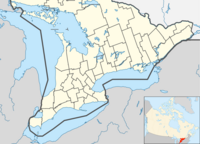Lambton Shores, Ontario
| Lambton Shores | |
|---|---|
| Municipality (lower-tier) | |
| Municipality of Lambton Shores | |

Grand Bend
|
|
| Coordinates: 43°11′N 81°54′W / 43.183°N 81.900°WCoordinates: 43°11′N 81°54′W / 43.183°N 81.900°W | |
| Country |
|
| Province |
|
| County | Lambton |
| Formed | 2001 |
| Government | |
| • Mayor | Bill Weber |
| • Federal riding | Lambton—Kent—Middlesex |
| • Prov. riding | Lambton—Kent—Middlesex |
| Area | |
| • Land | 331.08 km2 (127.83 sq mi) |
| Population (2011) | |
| • Total | 10,656 |
| • Density | 32.2/km2 (83/sq mi) |
| Time zone | EST (UTC-5) |
| • Summer (DST) | EDT (UTC-4) |
| Postal Code | N0N 1J 0-9/N0M |
| Area code(s) | 519 and 226 |
| Website | www.lambtonshores.ca |
Lambton Shores is a municipality in Lambton County, Ontario, Canada, that is on the southern shores of Lake Huron. It was formed in 2001 when the Towns of Bosanquet and Forest, and the Villages of Thedford, Arkona, Ipperwash, Port Franks, Ravenswood and Grand Bend were amalgamated.
Lambton Shores is one of the more southerly municipalities in Canada, and therefore receives relatively warmer temperatures. It has an average high of 26 °C (79 °F) in July and −1 °C (30 °F) in January. As for precipitation, it receives an average of 87 millimetres (3.4 in) of rain in July and an average of 45 centimetres (18 in) of snow in January.
The main communities in Lambton Shores are Arkona, Forest, Grand Bend, Port Franks and Thedford. Smaller communities include Cedarview, Glendale Beach, Kettle and Stoney Point, Ipperwash Beach, Lake Valley Grove, Jericho, Jura, Kinnaird, Northville, Ravenswood, Southcott Pines, Springvale, Sunnidale, Walden Place and Walker Woods.
Arkona is a community located in the municipality of Lambton Shores in southwestern Ontario near the Lambton–Middlesex county line, situated beside the Ausable River, on Former Kings Highway 79 (now Lambton County Road 79), Arkona is roughly halfway between Thedford, and Watford.
Forest is situated on what was once dense forest. When the Grand Trunk Railway was built through where the town now sits, the station was named for the dense forest. Hickory Creek, which meanders through the town, provided water for the station in those days when wood and water were essential to the operation of steam locomotives.
...
Wikipedia

